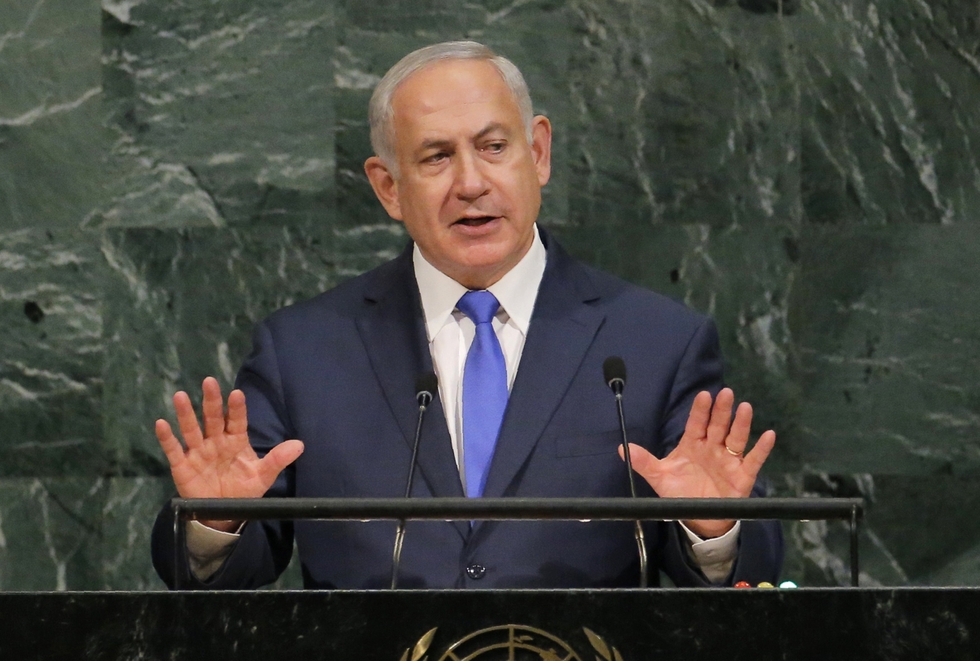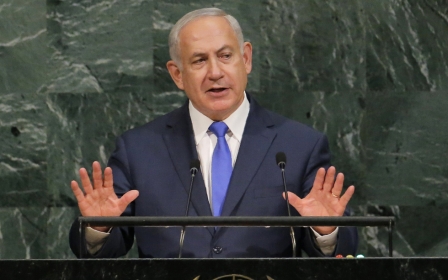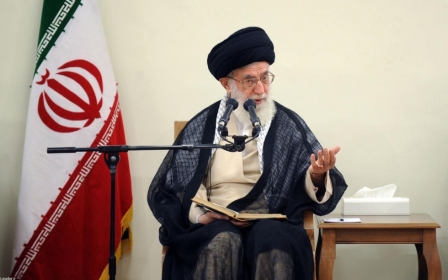Rocket man and Zionist penguins: The week in UN diplomacy

NEW YORK, United States – Over the years, the United Nations General Assembly (UNGA) has hosted some standout moments of political theatre. The key event this year was United States President Donald Trump’s debut speech, in which he threatened North Korea’s “rocket man” with annihilation.
Trump’s vow to “totally destroy” the hermit Asian nation of 26 million people along with its missile-toting leader, Kim Jong Un, certainly made the General Assembly’s biggest headline, but the gabfest in New York was not lacking in Middle Eastern diplomacy.
From Israeli Prime Minister Benjamin Netanyahu’s feeble “dad gags” from the marble dais to Trump’s signal that he would pull out of the nuclear deal with Iran, Middle East Eye picked out the key events for the region from the diplomatic din.
Bibi’s penguin friends
It’s been a tough few months for Netanyahu. The corruption probe is closing in, his wife Sara faces an indictment over $100,000 of dining bills and, all the while, there are foes across Israel’s borders and within his coalition government.
The pressures of leadership may account for some of the screwball moments in a 25-minute UN speech that was loaded with quips alongside his more usual shtick of pro-Israel eulogies and censure of regional bogeyman Iran.
For starters, the Likud leader took delegates on a journey to Antarctica, for the improbable revelation that the flightless birds swimming in the southern hemisphere’s icy waters are “enthusiastic supporters of Israel”.
“You laugh, but penguins have no difficulty recognising that some things are black and white, are right and wrong,” he said.
He was wrong about the first part: the audience had not laughed.
Next, he showcased his exasperation at denunciations of Israel from UN agencies. Netanyahu cited US tennis legend John McEnroe and affected a half-plausible New York accent to recite the athlete’s trademark line: “You can-not be serious!”
Finally, Netanyahu regaled a shrinking crowd with a yarn about Israel’s holy sites.
For proof, they could look in the Bible, he said. The book is not just a “great read” that he studies weekly and recommends “highly,” but also one that gets “4½ out of 5 stars on Amazon,” an online shopping website.
For some delegates, it was not just Netanyahu’s jokes that were cringe-worthy. His fawning praise of the 45th US president raised a few eyebrows. It began by recalling Trump’s visit to Jerusalem’s Wailing Wall in May.
“When the president touched those ancient stones, he touched our hearts forever,” Netanyahu said.
He peppered his speech with venerations of Trump. The president’s words from the same podium earlier on Tuesday morning had been “bolder” and “more courageous” than any other he had heard uttered under the UN’s domed roof, he added.
He was not the only leader that gave admiring speeches regarding Trump.
Before talks with his US counterpart on Wednesday, Palestinian President Mahmoud Abbas said Trump’s commitment to Middle East peace would help yield the “deal of the century” in the region.
A good week for Qatar
The Gulf island of Qatar got a boost in its 108-day-old rift with four neighbours at the UN headquarters this week.
First, Emir Sheikh Tamim bin Hamad al-Thani used his podium set piece to attack Saudi Arabia and its blockade colleagues. Later on Tuesday, his face-time with Trump was viewed as a signal that the US will not prioritise one Gulf ally over another.
From the UN rostrum, Sheikh Tamim accused his neighbours of using a boycott on food, medicine and other items to “destabilise” Qatar and extract policy concessions. “Isn’t this one of the definitions of terrorism?” he asked.
Early in the crisis, Trump had sided with Riyadh and called Qatar a “funder of terrorism”. But he has since worked to broker a way out of the impasse. Before his sit-down with Sheikh Tamim, he told reporters the dispute “will be solved pretty quickly”.
Sheikh Tamim said Washington’s “interference will help a lot”. That may be true. This week, a Bloomberg story said Trump had talked the Saudis and Emiratis out of their plans to use military force against Qatar earlier in the face-off.
“Those who oppose Qatar were obviously looking for signs that Trump would throw the emir under the bus. But it’s now clear that the US is trying to resolve the crisis in a way that doesn’t put the blame on any one party,” analyst Sigurd Neubauer told MEE.
Jonathan Cristol, a scholar at the World Policy Institute, a think-tank, agreed. “Whatever Riyadh says, more countries worry about Saudi-spread extremism than they do about Qatar-funded terrorism,” he told MEE.
Iran nuke deal has a half-life
The 2015 nuclear deal with Iran looked like it was decaying faster than an unstable isotope.
Trump called it “an embarrassment” during his speech to the 193-nation assembly and later tantalisingly told journalists he had already decided if he would move to pull the US out of the accord, but did not elaborate.
He is due to report to the US Congress by 15 October on whether to certify that Iran is upholding its side of the bargain, under which it accepted limits on its nuclear work. That could lead to Congress re-imposing sanctions and an unravelling of the deal.
Iranian President Hassan Rouhani bit back, saying the internationally backed accord should not be upended by “rogue newcomers to the world of politics,” in a clear swipe at Trump.
Netanyahu, who has long railed against a deal that was brokered during Barack Obama’s presidency, urged leaders to “fix it, or nix it”.
Despite frantic diplomacy between the US and its co-signatories on Wednesday, including the first face-time between US Secretary of State Rex Tillerson and his Iranian counterpart, Mohammad Javad Zarif, it remains unclear which route Trump will take.
Doha up, Riyadh down
Saudi Arabia, one of the Middle East’s heavyweights, typically plays a king-size role at General Assembly confabs. This year, its highest-ranking envoy has been Foreign Minister Adel al-Jubeir, as Riyadh kept a lower profile than usual.
Jubeir attended sessions on Rohingya bloodshed and Syria’s civil war and met with British counterpart Boris Johnson, among others. But the foreign policy jamboree did not make fertile ground for Saudis this year, UN insiders told MEE.
The row with Qatar has dragged out longer than expected, Riyadh faces growing outrage over civilian body bags from its coalition war in Yemen and it could soon be named on the UN’s “list of shame” of armed groups that harm children.
“Saudi Arabia cares about its reputation and has built a narrative that it is addressing concerns over civilian casualties during its war in Yemen,” said Dragica Mikavica, from the pressure group Watchlist on Children and Armed Conflict.
Shaming Riyadh for abuses in Yemen at the UN would be laudable, but may not affect real change, she added. “It would likely not seriously deter its backers and arms suppliers in Britain and the US,” Mikavica told MEE.
The kingdom is also in the crosshairs of a civil case in US courts - enabled by the 2016 Justice Against Sponsors of Terrorism Act (JASTA) - which allows Americans to sue Riyadh over its alleged role in the 9/11 attacks.
Terry Strada, who lost her husband on 9/11, said petrodollar lobbying potential has waned.
“The tide has turned and their money does not buy them the influence that it used to in Washington,” Strada told MEE. “You know why? It’s because they’re guilty. It’s not a secret anymore.”
Elsewhere at UNGA
There was plenty of other Middle East action at UN headquarters this week. On Thursday, the Security Council approved the creation of a UN investigation unit to collect evidence against fighters from the Islamic State (IS) group in Iraq for future war crimes and genocide prosecutions.
Earlier, British Prime Minister Theresa May took aim at Facebook, Google and other social media giants, urging them to more swiftly remove “terrorist content” from the internet and aim to stop it being uploaded in the first place.
Turkey’s President Recep Tayyip Erdogan used his podium slot to warn that a Kurdish independence referendum in northern Iraq this month could lead to fresh conflicts in the region. He later threatened to impose sanctions against the potential splitters.
Diplomats were unusually optimistic about Libya. UN envoy Ghassan Salame unveiled a roadmap to break a political stalemate in the North African country, which is ruled by three competing governments and has seen little but turmoil since a 2011 uprising.
Despite the scale of human suffering they produce, the conflicts in Syria and Yemen were notably absent from the lips of many envoys this week. With little prospect of diplomatic breakthroughs in either war, world leaders seemingly focused on more pressing headaches.
New MEE newsletter: Jerusalem Dispatch
Sign up to get the latest insights and analysis on Israel-Palestine, alongside Turkey Unpacked and other MEE newsletters
Middle East Eye delivers independent and unrivalled coverage and analysis of the Middle East, North Africa and beyond. To learn more about republishing this content and the associated fees, please fill out this form. More about MEE can be found here.




